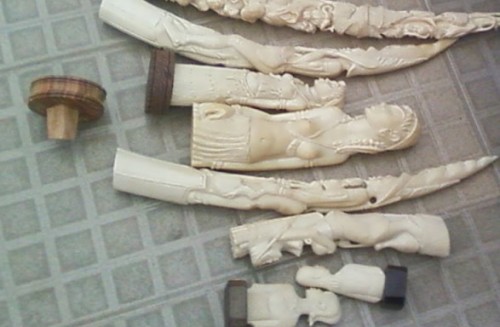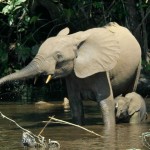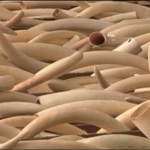
Across the Republic of Congo, wildlife traffickers are feeling the long arm of the law, thanks to the dedicated work of eco-guards in Odzala-Kokoua National Park and the Project for the Application of Law for Fauna (PALF).
Two Chinese nationals identified as an alleged ivory trader and his driver were arrested on October 15 by eco-guards working in Odzala-Kokoua National Park. During the course of his arrest, the ivory trader — caught red-handed with ivory — tried unsuccessfully to bribe a member of Odzala’s anti-poaching unit. The two men were transported to the police station in Ouesso the following day to make their official statements. They were both charged, but released. The case is currently before the country’s national prosecutor, according to a media release by African Parks.
The Odzala eco-guard unit comprises former poachers who applied for the park’s ground-breaking amnesty programme at the end of 2012. “While poaching is a more lucrative occupation than being an eco-guard, the amnesty recruits were attracted by the benefits of a stable, legal job with social security benefits,” said African Parks’s manager for Odzala-Kokoua National Park, Leon Lamprecht.
Some also admitted that Odzala’s anti-poaching efforts were making it increasingly difficult for them to continue hunting illegally and avoid arrest.
Five of the amnesty applicants confessed to previously working with a major regional ivory kingpin, Ghislain Ngondjo, known by the nickname “Pepito”, and their statements were admitted to the court in Ewo where he was tried. “Pepito” was convicted in July and is currently serving a five-year prison sentence.
Encouraging news was received from Naftali Honig of Congo-based Project for the Application of Law for Fauna (PALF), who reports that an ivory dealer was arrested in Sibiti (southern Congo) and a leopard skin dealer was arrested in Brazzaville, both during the last week of October. However, he reminds us that “the peddling of influence is enormous and the threat of corruption is constant.”
Unfortunately, the law is unevenly applied. While 5 wildlife criminals have been sentenced to 5 years in prison (maximum sentence) in 2013 alone, in certain Courts or for certain individuals with influence, we fear that the law is much more loosely applied.
Learn more about PALF on the “Fighting Corruption in the Congo” podcast.




